#author: gregory maguire
Explore tagged Tumblr posts
Text








Wicked dir. Jon M. Chu | 2024
“People who claim that they're evil are usually no worse than the rest of us… It's people who claim that they're good, or any way better than the rest of us, that you have to be wary of.” ― Gregory Maguire, Wicked: The Life and Times of the Wicked Witch of the West
#wicked#wickededit#filmedit#filmgifs#musicaledit#userteri#usertennant#tuserpris#henricavyll#bladesrunner#usersugar#userveronika#userrlaura#useraurore#tuserpolly#userchess#ours#by diana#author: gregory maguire
1K notes
·
View notes
Text
Gregory Maguire creates a fantasy world so rich and vivid that we will never look at Oz the same way again. Wicked is about a land where animals talk and strive to be treated like first-class citizens, Munchkinlanders seek the comfort of middle-class stability, and the Tin Man becomes a victim of domestic violence. And then there is the little green-skinned girl named Elphaba, who will grow up to become the infamous Wicked Witch of the West, a smart, prickly, and misunderstood creature who challenges all our preconceived notions about the nature of good and evil.
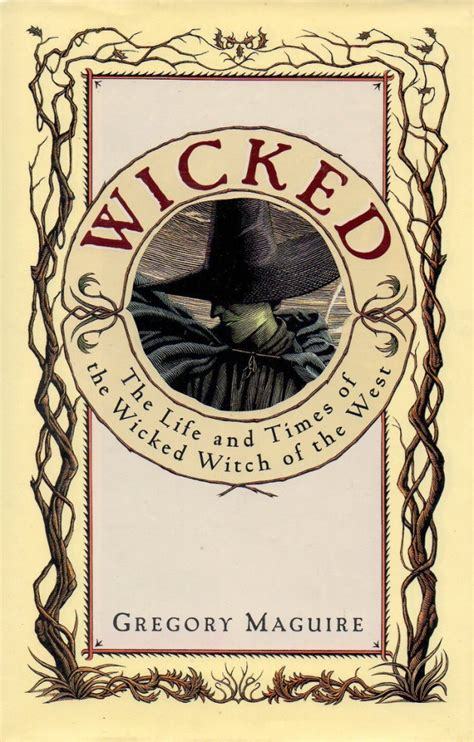
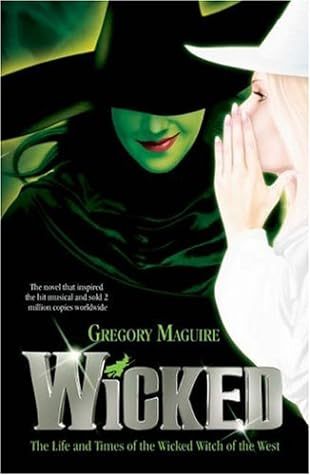
26 notes
·
View notes
Text
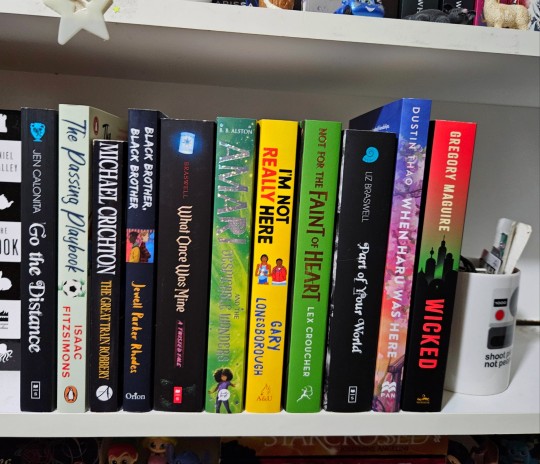
Day 1: JOMPBPC: Reading Goals
All the beautiful books on my TBR shelf, that I plan to read throughout 2025! 💙💜🩷
#justonemorepage#jompbpc#reading goals#tbr shelf#2025#jen calonita#isaac fitzsimmons#michael crichton#jewell parker rhodes#liz braswell#b.b. alston#gary lonesborough#lex croucher#dustin thao#gregory maguire#beautiful books#amazing authors#lgbtqia+#bookish#i love books
24 notes
·
View notes
Text
"Don't ask me for the truth, for cats lie in the sun, and dogs lie in the shade, and I lie whenever and wherever I can get away with it."
Gregory Maguire, Confessions of an Ugly Stepsister
#Gregory Maguire#Confessions of an Ugly Stepsister#truth#lies#lying#American literature#fairytale retelling#Cinderella#Pride Month#queer author#lgbtq author#quotes#quotes blog#literary quotes#literature quotes#literature#book quotes#books#words#text
2 notes
·
View notes
Text
GREGORY MAGUIRE??! in MY Song of Achilles?? it’s more likely than you think
#roadie rambles#the song of achilles#love when I like the author and they get interviewed by another author I like 💗💗💗💗#editor’s note: gregory maguire is the author of wicked
3 notes
·
View notes
Text

Gregory McGuire liked some of my posts from Twitter. Author of Wicked if this is real. I'll pretend even if it isn't.
2 notes
·
View notes
Text
lol the experiences people will experience if they go "I'm gonna read the book!" after they come out of part one of Wicked and have to wait a year for part two.
#to be clear i am a great hater of gregory maguire#i think his books are smug and self-important#when it comes to re-imaginings of classic stories about women you could stick your hand in a hat and find one of one hundred female authors#doing them#and all will be better at it than him#but even if they were better written... lmao#(it's not their reaction to the quality but the content that will be funny)
4 notes
·
View notes
Text
I think about number 3 a lot in regards to Wicked. I am genuinely baffled by this book and by the series as a whole and I can't decide if it's because it's not my cup of tea, if it just didn't do what I wanted it to do, or if it's just something my peanut brain can't understand.
The first one I get, it's a political allegory. Maguire said so himself. And it does a lot to discuss how villains are made. It even started a whole genre. But it also didn't really hit the notes I hoped it would. Is that because I saw the musical first and THAT shaped my opinion? Probably to some degree. The musical did a good balance of hitting those allegories but also keeping it way more streamlined, focused, and on Elphie and Glinda.
But those sequels? I feel like they really had an opportunity to say something about family, legacy, and how history rhymes. But it never really said that. Or at least not in the way I wanted it.
I'd really love to discuss this if anyone's down. Because I really want to like this series. I want to get it. But I just don't.
Folks act like "maybe the author isn't the final authority about what their work means" is some wanky post-modern nonsense and not a simple recognition that a lot of authors are perfectly prepared to bullshit about their own work. Like, leaving big-name popular media aside, I have personally encountered authors being actively disingenuous about their own work for all of the following reasons:
A true answer wouldn't fit the image they've cultivated.
They've decided they like the explanation the readers/viewers have come up with better than what they actually had in mind.
Something that was originally intended as a standalone work ended up growing into a franchise or series, and now they're pretending that was the plan all along for some reason.
They don't want to admit that the bit you're asking about is genuinely just a plot hole.
The real answer gets into some shit they don't care to discuss, so they've prepared a cover story to explain away the parts they don't want to talk about.
Their politics have changed since they wrote it, but they don't want to acknowledge that, so they're constantly trying to re-interpret everything they've ever written to be perfectly consistent with whatever their positions are this week.
They wrote it decades ago and they honestly don't remember what they were thinking at the time, so they're just making shit up; sometimes they also don't remember what shit they made up the last time, so the answer is different every time they're asked.
The work in question is at least partly autobiographical and they can't tell the truth without confessing to a crime in the process.
Most of the good bits are plagiarised and they don't really understand it themselves.
They're lying to you on purpose, for evil reasons.
#media#writing#death of the author#gregory maguire#wicked the life and times of the wicked witch of the west#books#elphaba thropp#the wizard of oz
16K notes
·
View notes
Text
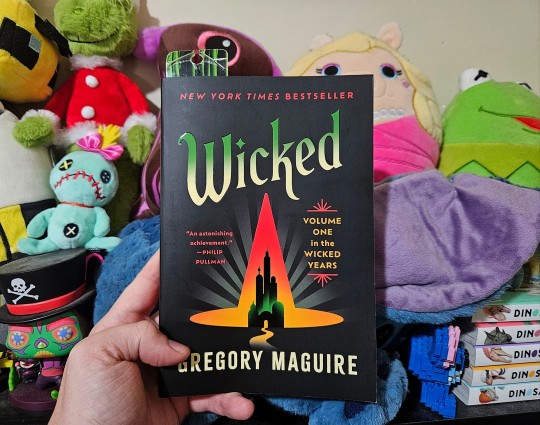
Day 2: JOMPBPC: Currently Reading 🩷💚
#justonemorepage#jompbpc#currently reading#wicked#the life and times of the wicked witch of the west#gregory maguire#beautiful book#beautiful cover#amazing author#plushies#i love books
5 notes
·
View notes
Text
Out of our need we patronize our artists, we flirt with our poets, we petition our architects: Give us your lusty colorful world. Signal to us a state of being more richly steeped in purpose and satisfaction than our own.
Gregory Maguire, Mirror Mirror
#Gregory Maguire#Mirror Mirror#art#artists#poets#architects#architecture#fairytale#fairytale retelling#Snow White#American literature#LGBTQ author#queer author#quotes#quotes blog#literary quotes#literature quotes#literature#book quotes#books#words#text
9 notes
·
View notes
Text
Oh, yeah, I read a bunch of his books back in ‘02 and/or ‘03. He really likes to give his readers whiplash with his… descriptive imagery. I see the reason behind it, but it definitely messes with you in the moment.
The dysfunctional relationship I'm developing with Gregory Maguire....sometimes he's really cooking and I lose my mind over it
Other times when he throws in an unfitting mention of piss and shit or a kid's genitals or whatever else he insists on talking about:
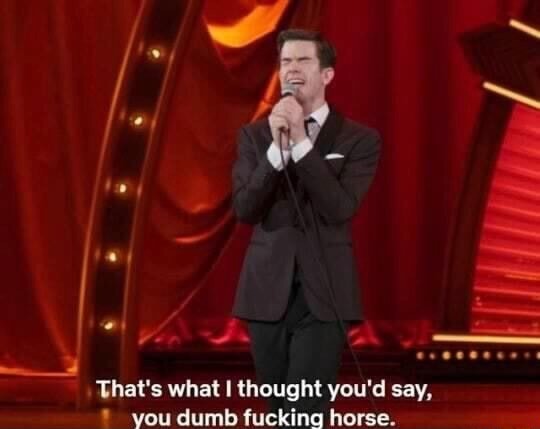
15 notes
·
View notes
Text
Here's another interesting discovery:
Just like many other authors, Gregory Maguire used celebrity facecasts in his mind when he wrote Wicked!
Elphaba he imagined looking like k.d. lang (only greener, of course):

Glinda like Melanie Griffith:

And Fiyero like Antonio Banderas:

(All these pictures are from the early '90s, since that's when he was writing the book.)
#wicked#gregory maguire#facecasting#elphaba#k.d. lang#glinda#melanie griffith#fiyero#antonio banderas
211 notes
·
View notes
Text
Writing Notes: Pastiche

Pastiche - a stylistic imitation of another work of art—be it literature, music, theater, or architecture.
Pastiche is a form of intertextuality in which an artist takes the central idea or theme of a work, and uses that to create an original piece.
Pastiche can also be a composite of various sources, forming a hodgepodge of different works mixed together.
Not to be confused with parody, which is a new work that mocks an original work, pastiche is used as an homage to its source material.
Tips for Writing a Pastiche
Study the original work. Before you attempt a pastiche that is inspired by another artist’s work, you want to know the original work’s messages, characters, and literary conventions inside and out. Once you have a firm grasp of what inspires you about this work or works, you can get a firm grasp of what elements will be interesting to experiment with in your piece.
Restructure the original work. You can write a pastiche by altering the different elements of an existing work—including genre, character point of view, or tone. Make a popular romantic work of literature into a work of modern minimalism, replete with ennui. Alter the gender of the main character, and see how this alters their experience in the world of your piece. Make an ancillary character the main character to play with the point of view in the piece.
Infuse your own meaning. In order to make your pastiche stand out from the original work, you’ll want to apply your fresh point of view. Make sure to use the elements that you borrow from the source material in an innovative way, to avoid a piece that comes across as too derivative or stolen.
Combine different works. There is no limit to the number of stories and characters you can incorporate into your pastiche. You might be inspired by a common theme in three or so works, or by three main characters from different stories who have similar character flaws. Combining elements from different works and genres gives you lots of room to be creative.
Examples of Literary Pastiche
There are many examples of pastiche that exist within the literary world, such as:
Rosencrantz and Guildenstern are Dead by Tom Stoppard (1990): Tom Stoppard’s Rosencrantz and Guildenstern are Dead is an absurdist play that expands upon two side characters in Shakespeare’s Hamlet. This tragicomedy explores the lives, activities, and perspectives of these two minor characters as they interweave with the plot of the original play.
Wicked: The Life and Times of the Wicked Witch of the West by Gregory Maguire (1995): Though closely associated with literary parody, this novel by Gregory Maguire was written as a prequel to the classic 1939 film The Wizard of Oz. The story is a biography of the misunderstood, green-skinned girl named Elphaba, who would come to be known as the villainous Wicked Witch of the West. This novel was famously adapted into the Tony Award-winning musical Wicked in 2003.
Mrs. Osmond by John Banville (2017): Modern author John Banville wrote the novel Mrs. Osmond in the style of Henry James’ seminal Victorian novel, Portrait of a Lady. In the story, Banville extends the life of James’ protagonist Isabel Archer in a darkly humorous way.
The Final Solution by Michael Chabon (2003): Like many other works of pastiche, Michael Chabon’s novella The Final Solution is inspired by Sir Arthur Conan Doyle’s iconic detective Sherlock Holmes. The 89-year-old main character thought to be Holmes—who is only referred to as “the old man”—seeks out a missing parrot, who is the best friend of a young boy.
Purpose of a Pastiche
To celebrate an original work from which the creator appropriates or uses various elements.
Can help create variety within a work by borrowing elements from an existing work of art, in some cases creating new or mixed genres.
Can also be useful for brand new writers, artists, or filmmakers by providing inspirational groundwork to inform the style or point of view of their work.
Source ⚜ More: Writing Notes & References ⚜ Writing Resources PDFs
#pastiche#writing tips#writing notes#writeblr#literature#fiction#writers on tumblr#writing reference#dark academia#spilled ink#writing prompt#creative writing#writing advice#on writing#light academia#writing inspiration#writing ideas#writing resources
72 notes
·
View notes
Text
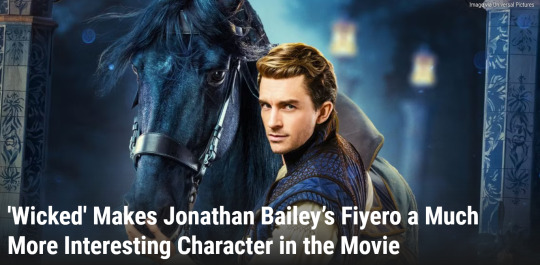
When it comes to long-awaited films, there are few movies with as much anticipation as Wicked. Inspired by Gregory Maguire’s best-selling novel, it became a cultural juggernaut when it transitioned to the Broadway stage. Now, one can't talk about the Wicked Witch of the West without talking about Elphaba (Cynthia Erivo) and Galinda/Glinda (Ariana Grande). While the massive film has brought Oz’s witches to life like never before, it's Fiyero (Jonathan Bailey) who’s most benefitted from the stage-to-screen transition.
Fiyero's roots can be traced back to author L. Frank Baum’s original Oz lore, though the Winkie Prince himself is Maguire’s creation. On stage, Fiyero is a lovable troublemaker who flirts, and of course, dances, his way through life. The big screen version of Wicked honors this while adding a uniquely wonderful twist to his Lothario nature. When Fiyero arrives in the show, he charms Galinda in a very similar way to what he does on screen, but Fiyero’s actions in the movie aren’t solely to impress Galinda. Rather, he is out to create a real sense of joy for everyone, an effort that is made clear through his flirtation. While an ensemble number on Broadway, his stage counterpart spends the whole of the song with Galinda, where the film has him flirt and dance with a multitude of Shiz students to help them celebrate life.
While Fiyero mirrors some of cinema’s most iconic “bad boys,”one of the best changes the movie makes is his sexual ambiguity. He shares his seductive side with all of his fellow students, no matter their gender. And, what’s more, he genuinely enjoys it, sharing some of his steamiest flirtations with male cohorts. It’s a wonderful way to not only shake up the archetype but also makes Fiyero himself feel more fleshed out. But the greatest alteration comes from his relationship with Elphaba.
Elphaba Reveals That Bailey’s Fiyero Is Deeper Than He Seems
On stage, Fiyero starts to show depth in the second act, but Wicked doesn’t make audiences wait for the second film to see that there is more to the character. Both of Fiyero’s scenes with Elphaba exist on stage, but Bailey and Erivo fill their interactions with nuance. Both actors give their first meeting new meaning with the screen version. The musical usually plays this moment as an unpleasant introduction, but Erivo and Bailey play the scene as an undeniable flirtation. It’s a fantastic way to set up Elphaba’s upcoming conflict and solidify the complication that brews below Fiyero’s surface. Bailey brings a boyish charm to the scene that makes it clear he is undeniably taken with Elphaba (the first person in the film to be so), and he continues to add depth to the character after he and Elphaba free the imprisoned lion cub.
She gets under his skin in a way no one else can. While many in Shiz lust for Fiyero, no one can see his internal unhappiness except for her. When she touches him, Bailey shifts his performance and makes it clear that she is the first person to make Fiyero really look within and question what he wants out of life. It’s a beautiful way to foreshadow the conflict he will continue to face in the second part of Wicked and pulls on the heartstrings of moviegoers. He immediately goes from a lovable flirt to a relatable, deeply complicated young man who just might find himself in the woman who will eventually be perceived as Oz’s greatest villain.
Indeed, there is no denying that Wicked has used its new medium to reinvent Fiyero. From twisting an age-old archetype to Bailey’s fantastically intricate performance, he’s become a far more interesting version of the character. As audiences anticipate the next installment, it’s safe to say that Fiyero is set up for even more exploration.
Source
211 notes
·
View notes
Text
To be fair, this is when their relationship starts shifting to that direction in the Books.
Also, by Gregory Maguire logic, we don’t know what happened while the writer wasn’t writing. Just because a ‘camera’ wasn’t there doesn’t mean something isn’t happening.
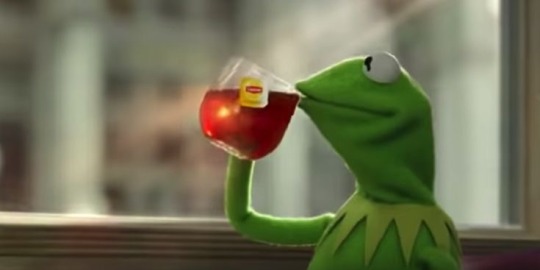
Just saying.
uhhh sure okay. yeah i guess. maybe killing a giant monster in a bloody and horrific battle after finally finding and releasing the beast inside of you COULD be considered a turn on
#dyreshipping#drew ferran#lady whitley#wereworld#wolf king#Gregory Maguire is the author of Wicked btw
7 notes
·
View notes
Text
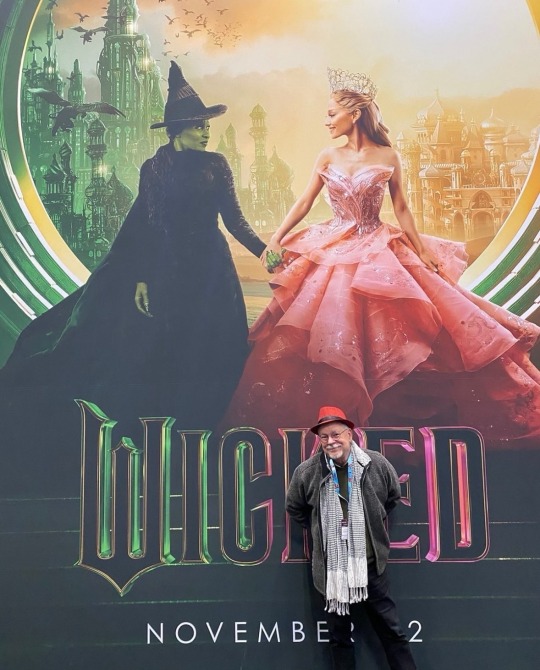
Gregory Maguire, the author of the book WICKED was based on, in a new Instagram post.
#wicked#wicked movie#ariana grande#glinda upland#elphaba thropp#gelphie#cynthia erivo#dailygrande#galinda upland#wicked the musical#gregory maguire
196 notes
·
View notes